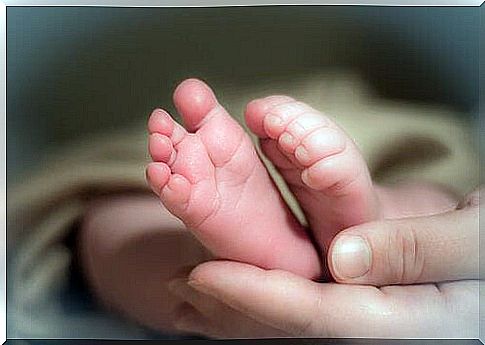Perinatal Grief: What All Women Suffer

Perinatal grief is that which arises from the baby’s death, before or a few days after birth. It is an intense pain that takes the mother, her partner and the family by surprise.
The woman, her partner and her family must go through perinatal grief. Like any loss of a loved one, this situation leaves a deep emotional imprint, with the aggravating circumstance that the parents and other close relatives have not gotten to know the baby.
When pregnancy results in a sad stat

Confirmation of a desired pregnancy is an explosion of happiness. Almost inevitably, an explosion of emotions, desires and expectations begins. However, it is necessary to get past the first trimester to be sure that the pregnancy will take place without major risks.
Miscarriages are those that occur before the 12th or 13th week of pregnancy. Although they cause intense emotional distress in women, they are not technically considered to be perinatal grief.
This mourning is called perinatal because it results from the baby’s death in the perinatal period. This period is from the 22nd week of gestation to one week after birth.
Perinatal mourning is lived in silence

To the intense pain that means losing the child that was so eagerly awaited, there is also the fact that perinatal grief is not usually recognized by the parents’ social and work environments. Which makes the process of acceptance and healing even more complex and slower.
There are several factors that can intensify the emotional discomfort of a woman who has lost her baby:
- Previous miscarriages or perinatal deaths that have not been overcome.
- The time it took for the baby to conceive.
- The age of the woman who, over time, puts extra pressure on conception.
- The loss of a multiple pregnancy.
- The feeling of attachment that may have developed, especially if the child was born.
- Lack of social support. The health plan and hospital centers do not always provide conditions to deal with these cases.
- The absence of the father who did not commit to the pregnancy.
- The inability to share experiences and memories with family or social environment, name the baby or say goodbye.
Stages of perinatal grief
Perinatal grief can last for days, weeks, months or even years. It will all depend on the woman’s temperament and the conditions surrounding the baby’s death.
Like any grief, it consists of several phases or stages.
denial phase
This is a stage where it is difficult to believe that perinatal death has occurred. The woman’s mind was not prepared to receive such shocking news.
On the other hand, this state of shock and disbelief is the mind’s mechanism to digest the overwhelming reality little by little.
anger phase

This phase appears when the mother feels guilty about what happened. She is angry with herself, her partner, and the doctors who have been in contact with her baby.
If the woman is religious, she will be upset with God, because she won’t understand the reasons why it happened. It is also common to envy couples who have lived through their pregnancies without complications and are enjoying their children.
negotiation phase
This phase begins when guilt becomes confusion. “ If I had done this or that” is what mobilizes or disturbs the parents who suffered the loss.
No doubt they wonder again and again what would have happened if, instead of doing one thing or another, they had done something different to prevent their child’s death. They also imagine how good it would be to have the baby.
depression phase

The negotiation is short-lived and gives way to depression. Faced with the irrevocable reality that perinatal death means, emotions or symptoms such as sadness, reluctance, sleep disturbance or loss of appetite arise.
Also, there will be anxiety about getting pregnant again or the fear that the same thing will happen with the next pregnancy.
acceptance phase
It is the final stage of the perinatal grief process. That’s when you accept that you need to go on living despite having suffered a loss.
Little by little, the daily routine is resumed. However, the hope of conceiving a new baby still takes some time to appear.
Tips for overcoming perinatal grief
If you have just suffered the loss of a baby, you have a right to live through your perinatal pain. It needs to be that way so that you can accept, cry and heal the wound left by the fact that your pregnancy did not come to a happy outcome.
To live and overcome the different phases of perinatal grief, we will make the following recommendations:
- First, your doctor should give you a detailed explanation of the medical reasons that caused your loss, as well as the consequences that may result for future generations.
- Also, don’t refrain from naming your baby in front of your partner, relatives, friends or co-workers. To go through grief, you don’t have to forget about the baby you lost.
- On the other hand, suffer freely from your loss. Avoid setting deadlines for recovering.
- In addition, you should also do whatever it takes to feel a little better each day.
- Definitely don’t forget to take care of your physical and emotional health. If you need professional help, don’t hesitate to seek it out.
- In turn, no one can pressure you on what fate will be given to the clothes or accessories you had bought for the baby.
- Certainly, laughter is healthy. Don’t be afraid or believe it will dishonor the departed baby’s memory.
- Finally, if you need to perform a ritual to say goodbye, honor or remember the baby, do it.









